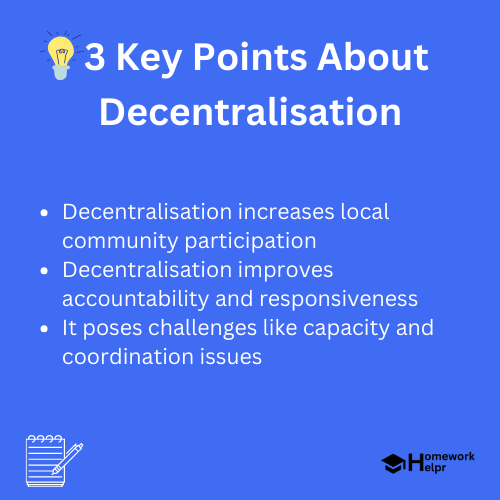📝 Summary
Decentralisation is a process that involves distributing functions and authority away from a central authority, allowing for greater participation by local communities. It promotes improved accountability and responsiveness within democratic systems by enabling local decision-making. The types of decentralisation include administrative, political, and fiscal decentralisation, each contributing to effective governance. However, challenges such as capacity issues and coordination problems exist, alongside potential resource imbalances. In technology, decentralisation strengthens security and transparency through networks like blockchain, showcasing its broad impact on modern governance.
Understanding Decentralisation
Decentralisation is a process that involves distributing or dispersing functions, powers, people, or decision-making away from a central authority. In simpler terms, it means a system where authority and responsibility are shared among various levels of government or organisations, rather than being concentrated in a single, central point. The concept can apply to various fields including politics, business, and even technology.
Definition
Decentralisation: The process through which the activities of an organisation, particularly those regarding planning and decision-making, are distributed or delegated away from a central, authoritative location or group.
In many countries, especially democratic ones, decentralisation is viewed positively as it often leads to greater participation by local communities. This can improve accountability and responsiveness to the needs of the public. It contrasts with a centralised system where all decisions are made at a higher level, typically resulting in a less efficient process.
Examples
The Government of India has adopted a decentralised approach by allowing state governments to make decisions on education and health care, ensuring that local needs are addressed more effectively.
Types of Decentralisation
Decentralisation comes in different forms, primarily classified as:
- Administrative Decentralisation: This type involves redistributing authority and responsibilities among different levels of government. It includes delegation (where responsibilities are transferred to lower levels), deconcentration (which simplifies administrative tasks), and divestiture (where government entities transfer certain responsibilities to private entities).
- Political Decentralisation: This form emphasizes the empowerment of local governments and communities. This allows citizens more significant involvement in decision-making processes that affect their lives.
- Fiscal Decentralisation: This refers to the allocation of financial resources and powers. It involves granting local governments the authority to generate their revenues and manage the funds according to local needs.
Definition
Deconcentration: A form of administrative decentralisation where central government authorities delegate responsibilities to local or regional offices, enhancing the distribution of administrative tasks.
Importance of Decentralisation
Decentralisation holds immense significance in modern governance and organisational management due to several key reasons. Some of the benefits include:
- Increased Efficiency: Local authorities often have a better understanding of the needs of their communities than a distant central authority, leading to more efficient services.
- Enhanced Accountability: When power is decentralised, it allows local leaders to be more directly accountable to their constituents.
- Promotion of Local Development: Communities can tailor their development plans according to their unique needs and resources, ultimately fostering growth.
Examples
In many Latin American countries, decentralisation reforms led to improved infrastructure and public services as local governments adapted to their specific contexts.
Challenges of Decentralisation
Despite its various advantages, decentralisation also comes with its own set of challenges:
- Capacity Issues: Local governments often lack the necessary skills, resources, or capacity to carry out their responsibilities effectively, especially in developing nations.
- Coordination Problems: Different levels of government must coordinate effectively to avoid overlaps and gaps in service delivery.
- Unequal Distribution of Resources: Decentralisation may lead to imbalances where affluent regions thrive while less developed areas struggle.
Definition
Capacity Issues: Refers to the limitations of local authorities in terms of skills, experience, or resources that hinder them from fulfilling their responsibilities effectively.
Decentralisation in Technology
Decentralisation is not restricted to governance and politics; it also permeates technology, especially with the advent of concepts like blockchain. In a decentralised network, data is stored across multiple locations rather than a single central server. This has several implications:
- Security: With data being spread across many nodes, it becomes harder for hackers to compromise the system.
- Transparency: Changes and transactions can be tracked easily, enhancing trust among users.
- Date integrity: Decentralised systems tend to have a lower risk of corruption or loss of data.
❓Did You Know?
Did you know? Bitcoin, the most popular cryptocurrency, operates on a decentralised network that makes transactions transparent and secure!
Examples of Decentralisation in Action
Across the globe, numerous examples highlight the efficacy of decentralisation:
- Switzerland is known for its strong decentralised political structure where cantons operate independently, catering to local needs.
- The city of Barcelona in Spain has implemented decentralised governance in local decision making, empowering citizens’ councils.
Examples
The transition to a decentralised governance structure in South Africa after the end of apartheid has allowed diverse communities to participate in their local governance.
Conclusion
Decentralisation represents a paradigm shift in how governance and organisational structures operate. By empowering local authorities, organisations can become more responsive to their communities‚Äô needs. While challenges exist, the potential benefits make decentralisation a relevant and essential consideration in today‚’ rapidly changing world.
As students, understanding decentralisation opens up discussions about governance, accountability, and how decisions impact our daily lives. It allows you to appreciate the importance of being engaged citizens in a decentralised world.

Related Questions on Decentralisation
What is decentralisation?
Answer: Decentralisation is distributing authority away from a central point.
What are the types of decentralisation?
Answer: The types are administrative, political, and fiscal.
What benefits does decentralisation offer?
Answer: It increases efficiency and promotes local development.
What challenges does decentralisation face?
Answer: Challenges include capacity issues and coordination problems.
